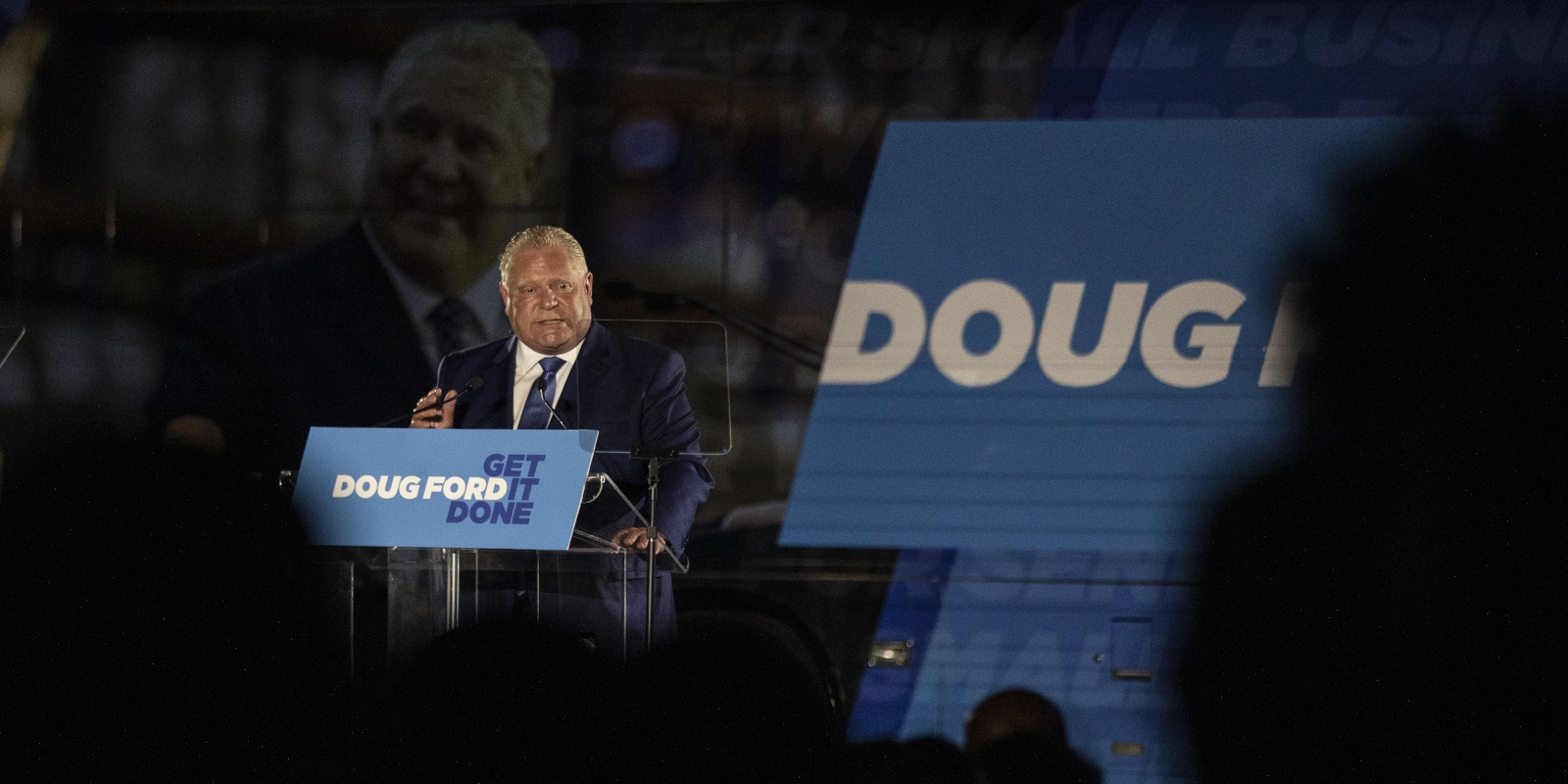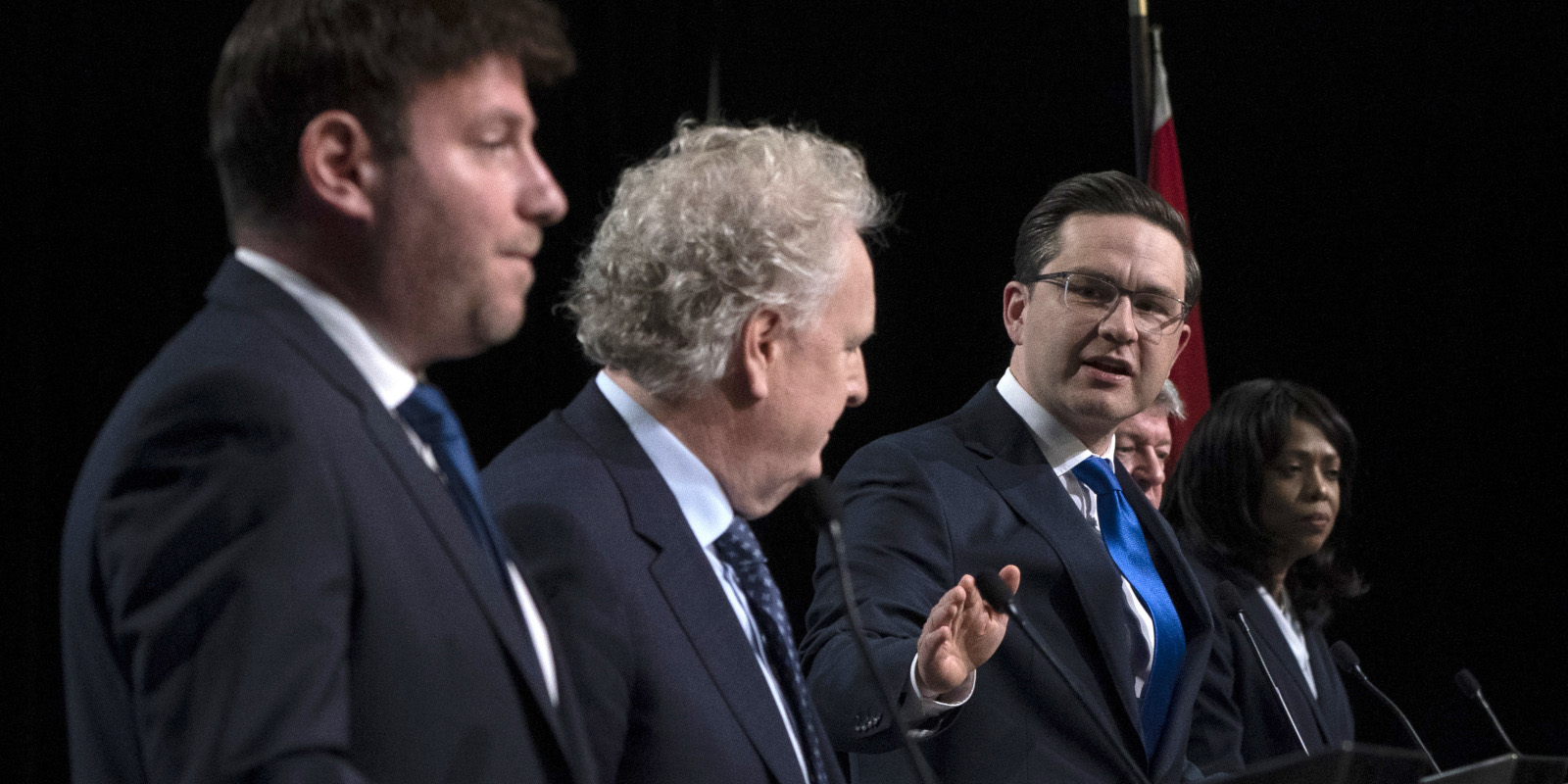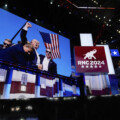On an unseasonably scorching May evening in Ottawa, an eclectic crowd gathered in a small conference room in the city’s west end. The Ontario election has mostly elicited yawns from the electorate but this meeting of the New Blue Party had an electric undercurrent.
It is a classic trope of political campaigning for organizers to book a smaller room than needed and lure journalists into stories about overflowing halls and extra chairs being brought in to satisfy the demand.
Cramming more than 100 people into the tiny conference room at the Hyatt Place in Nepean seemed to be a genuine miscalculation, though, as supporters squeezed together uncomfortably in the warm temperatures and spilled into the hallway.
Belinda Karahalios, whose husband Jim Karahalios leads the party, said the event “tripled our expectations.”
The party is only a year-and-a-half old and is a result of some personal grudges against the governing Progressive Conservatives and a resilient sense among some voters that the PCs have campaigned to the right and governed to the left.
Like any grassroots party, it scorns the establishment, whether it’s Doug Ford’s PC Party or Justin Trudeau’s Liberal Party.
Party leader Jim Karahalios wrapped up his speech at around 8 p.m. while, across the country in Edmonton, the Conservative Party leadership candidates were getting ready to hold their first official leadership debate. No one in the packed conference room seemed to know or care.
In a series of speeches given by local candidates, followed by former PC MLA Belinda Karahalios and then Jim Karahalios, the mainstream parties were mocked and pilloried. Belinda Karahalios was booted from Doug Ford’s PC caucus after resisting a bill to give the government sweeping emergency powers during the COVID-19 pandemic and her main promise to voters is that she will represent them, rather than succumb to party whips or lobbyists.
“That party is rotten to the core,” she said, during a short speech that mostly told the story of her battle against the party machine.
Jim Karahalios resisted the “right wing” label for his own party, referring to it simply as a grassroots movement and describing its supporters as people who believe the system has been hijacked. The key applause lines in Jim Karahalios’ speech, though, were all issues that target Ford’s right flank, from taxes, to fiscal policy, to school curriculum, which he says is infested with critical race theory.
Jim Karahalios described the Ford government as “the provincial wing of the Justin Trudeau federal Liberal Party” and an “extension of the McGuinty-Wynne government.” His speech decried the industrial carbon tax brought in by the PCs and pointed out that even after removing COVID-19 spending, the size of government in Ontario has grown under Ford.
The New Blue Ontario Party is not the only party to see an opportunity on Ford’s right flank.
The Ontario Party is led by former federal Conservative malcontent Derek Sloan, who was booted from the party by former leader Erin O’Toole. After running as an independent in the 2021 federal election in the Alberta riding of Banff—Airdrie, Sloan was soundly defeated by the local Conservative incumbent. On the campaign trail, Sloan has been voicing his opposition to vaccine mandates and declaring his enthusiasm for freedom.
During a recent speech in Sudbury, Sloan warned about the “ongoing and encroaching surveillance state” that he said resembles Communist China, decried plans by the World Economic Forum to put “microchips in our bodies and in our heads,” and said there’s a “strong libertarian flair” to his party, according to a local news site.Ontario Party Leader Derek Sloan talks ‘freedoms’ in Sudbury – https://www.sudbury.com/local-news/ontario-party-leader-derek-sloan-talks-freedoms-in-sudbury-5345587
Sloan was recently banned from Twitter, which he believes is due to comments that were critical of COVID-19 vaccines.
At the New Blue Party event, an eclectic group of local candidates took turns delivering short speeches, with most of them successfully toeing the line between opposition to vaccine mandates and pandemic policies and the insidious conspiracy theories that have been seeping into right wing politics on this topic. When one candidate broke into a rant about vaccine side effects and insulted a CBC cameraman, he admitted to the crowd that he was getting head shakes and disapproval from party members assembled just outside the door of the room.
Although the two parties haven’t been getting much media attention, they represent an ongoing phenomenon in Canadian politics as the country emerges from a two-year pandemic. Anger about COVID-19 restrictions has sparked a movement in Alberta to oust Premier Jason Kenney, who will learn the results of an extraordinary review of his leadership on Wednesday. Earlier this year, Ontario was a focal point of a massive protest against vaccine mandates and various other pandemic policies. Truckers and heavy vehicles seized downtown Ottawa for weeks and border crossings were blockaded by protesters, causing a major trade disruption.
The trucker protests, which Jim Karahalios attended in the first week, have been a similar mix of genuine opposition to pandemic policies combined with extremism about overthrowing the government, vaccine misinformation, and conspiracy theories.
In last year’s federal election, the People’s Party of Canada tallied its best-ever numbers by winning five percent of the popular vote and hosting raucous rallies around the country. In Ontario, the PPC out-performed its national vote shared by earning 5.5 percent of votes.
It’s likely the PPC pulled voters angry about pandemic restrictions away from the Conservative Party and possibly cost the party seats by splitting the vote.
In the 2021 federal election, a calculation by Global News found that the Conservative Party’s margin of loss was smaller than the PPC vote share in 20 ridings, possibly costing them many of those seats.Canada election: Did the PPC split the Conservative vote? Maybe — but it’s not that simple – https://globalnews.ca/news/8212872/canada-election-conservative-vote-splitting/
According to pre-election polling, about half of the PPC’s voters said the Conservative Party was their second choice. A deeper analysis conducted a month after the election by Global News found that not securing those voters cost the Conservative Party six seats, with five of them going to the Liberal Party. The Liberals secured a minority government with 160 seats.People’s Party may have cost the Tories 6 ridings on election night – https://globalnews.ca/news/6071771/ppc-conservative-spoiler-election
If Ontario’s new right wing parties can combine to match the popular vote performance of the PPC of 5.5 percent, it would be greater than the PC margin of victory in the previous election in a dozen ridings in the province.
And a recent poll by Leger and Postmedia last week shows that the New Blue Party seems to be attracting disgruntled conservatives. The party attracted three percent support, which is up from two percent the previous week and is only one percentage point behind the Green Party.Ontario election: Ford’s PCs pull away from Liberals in new poll that should worry Del Duca – https://nationalpost.com/news/ontario-election/ontario-election-fords-pcs-pull-away-from-liberals-in-new-poll-that-should-worry-del-duca
Most of the pandemic restrictions have been dropped in Ontario and the summer weather is pushing the pandemic down the list of voter priorities, but the province’s new right wing parties are hoping that voters remember that the PC government imposed the longest school closures in North America and Toronto residents endured one of the longest indoor dining bans in the world.
At the event in Ottawa, Jim Karahalios declined to answer what victory would look like for his party, whether it was winning a seat, building up vote-share, or simply successfully running candidates in all 124 ridings.
“If we stop, things will get worse a whole lot faster,” said Jim Karahalios.
Recommended for You

Ginny Roth: J.D. Vance, Pierre Poilievre, and how they slice their economic pie

David Polansky: As President Biden leaves the race, will the Democratic Party hodgepodge hold?

Peter Menzies: The mainstream media should love Doug Ford, now that he’s subsidizing them

Geoff Russ: A future Conservative government must fight the culture war, not stand idly by








